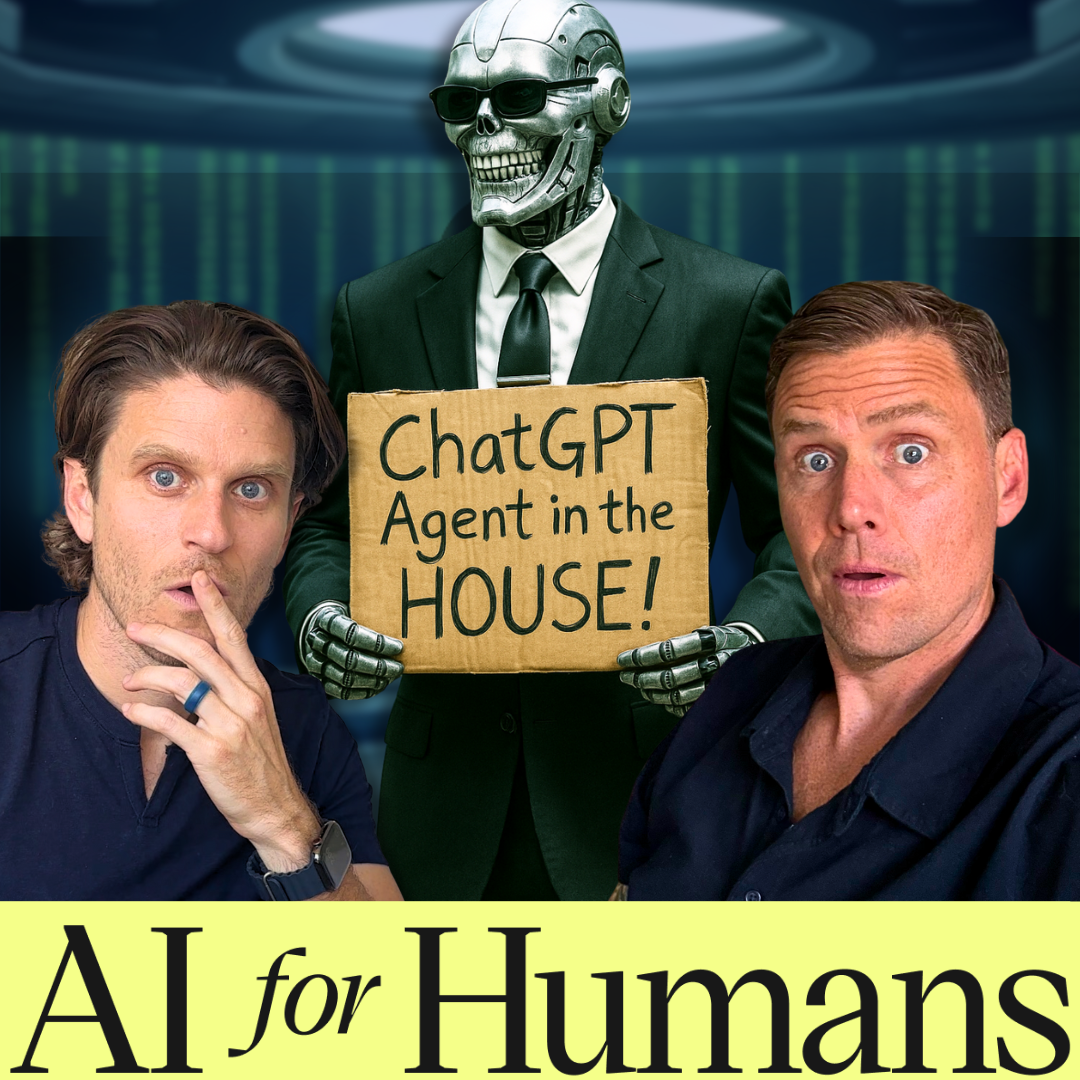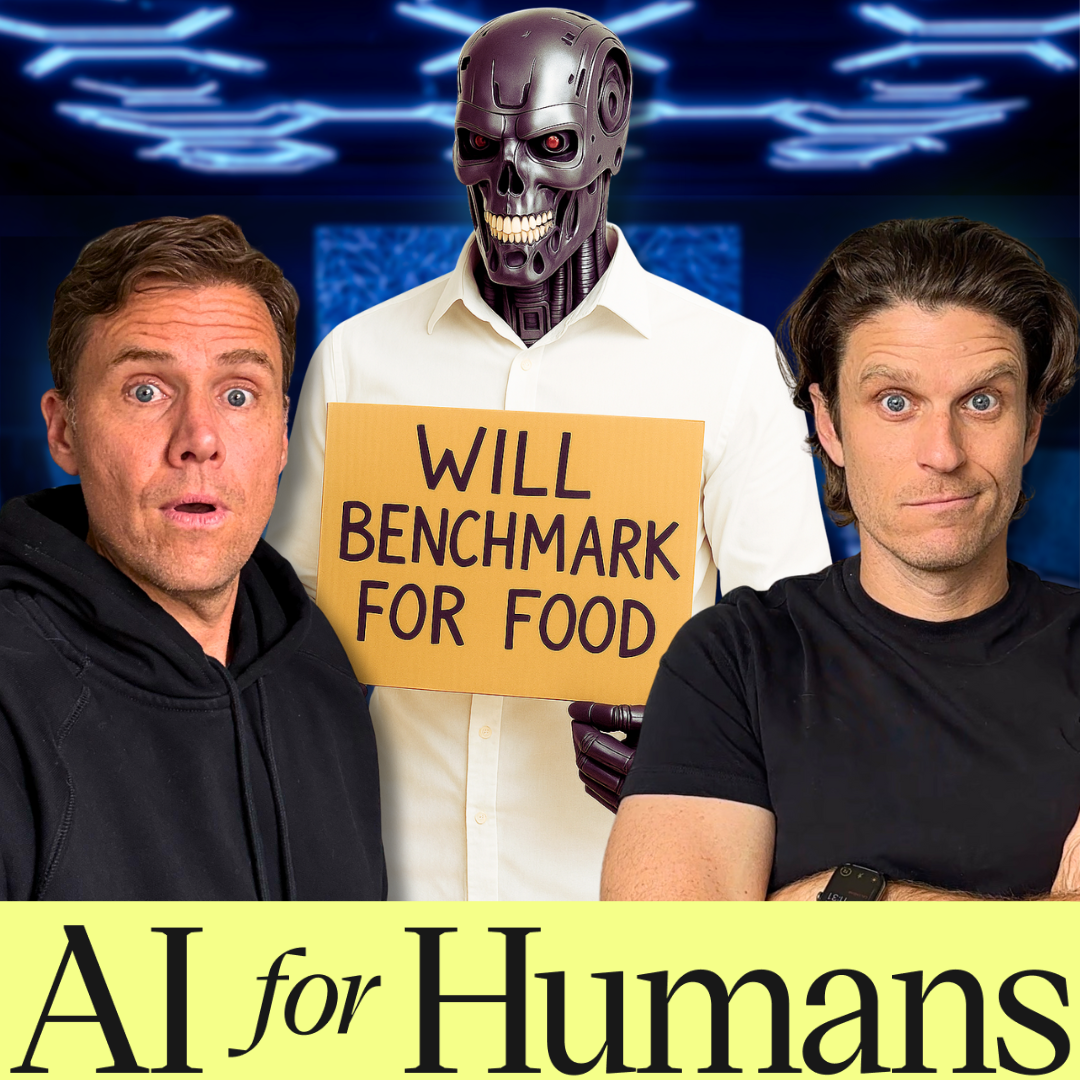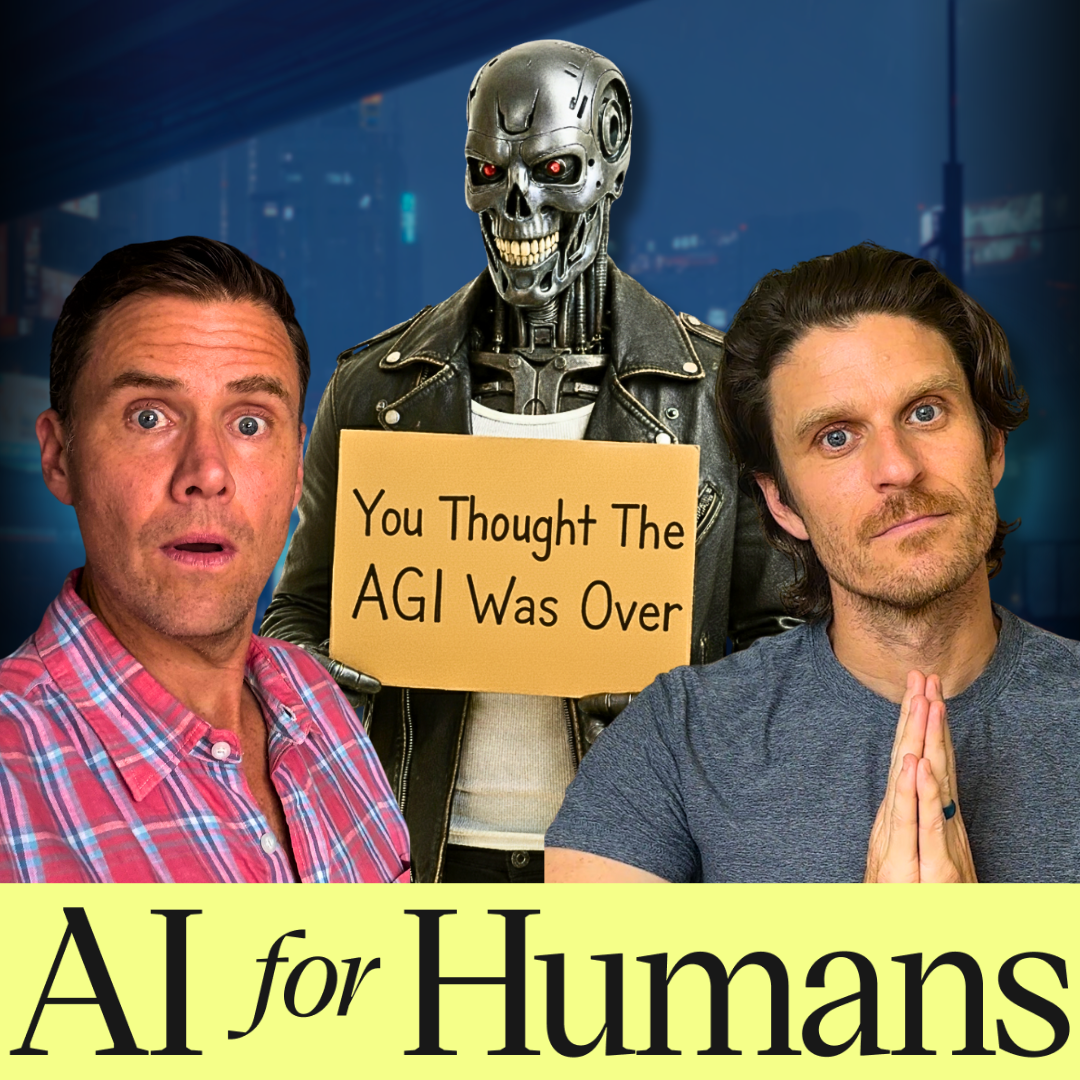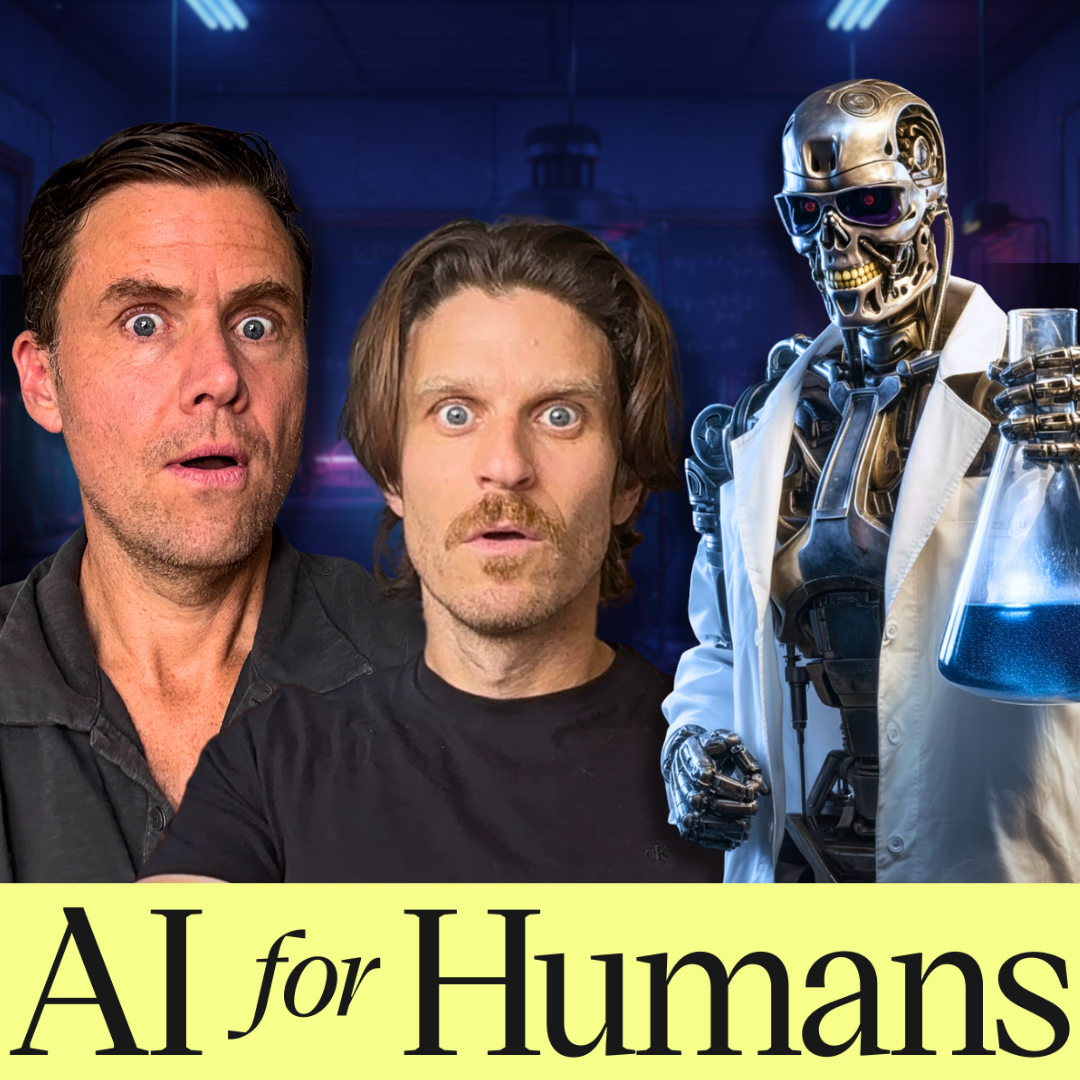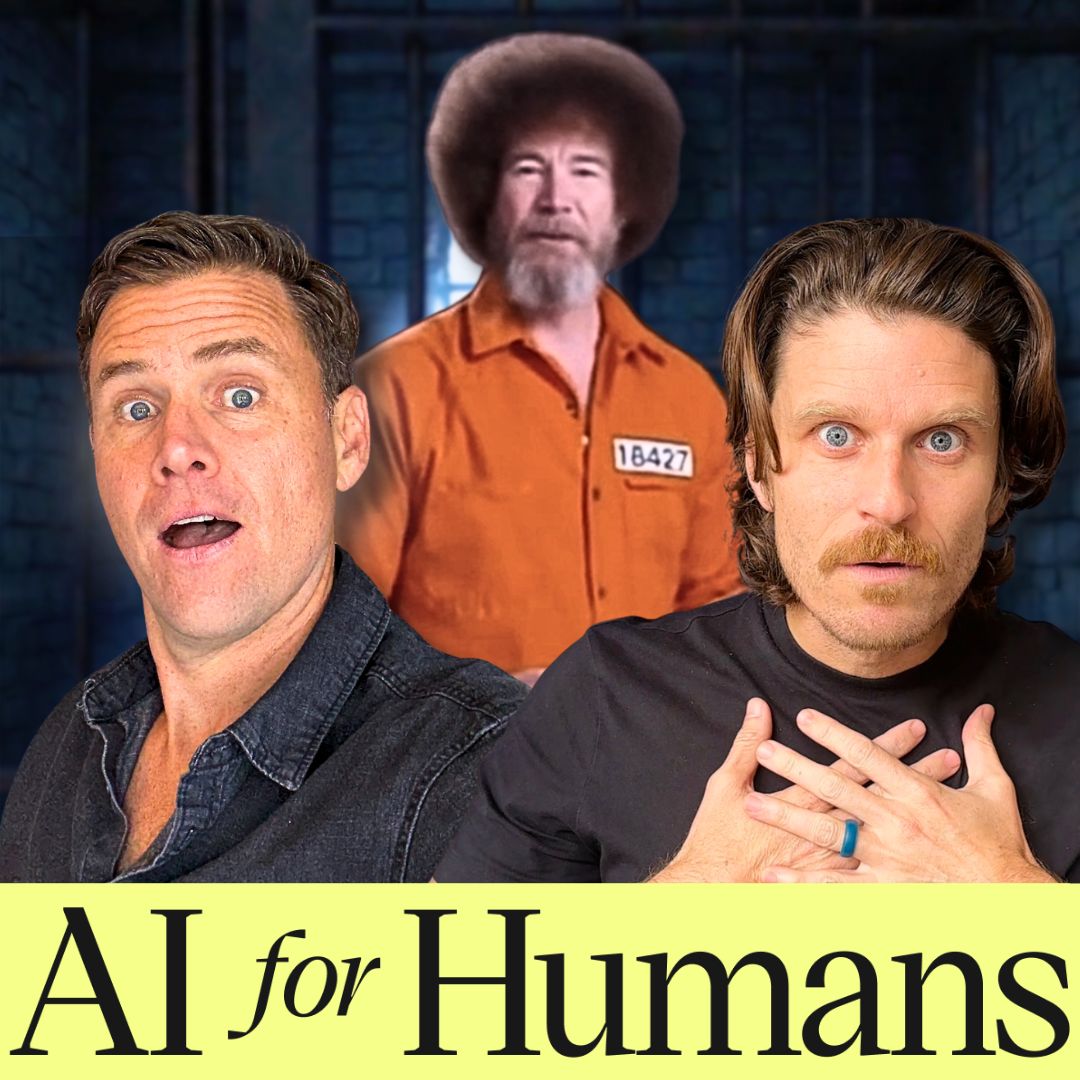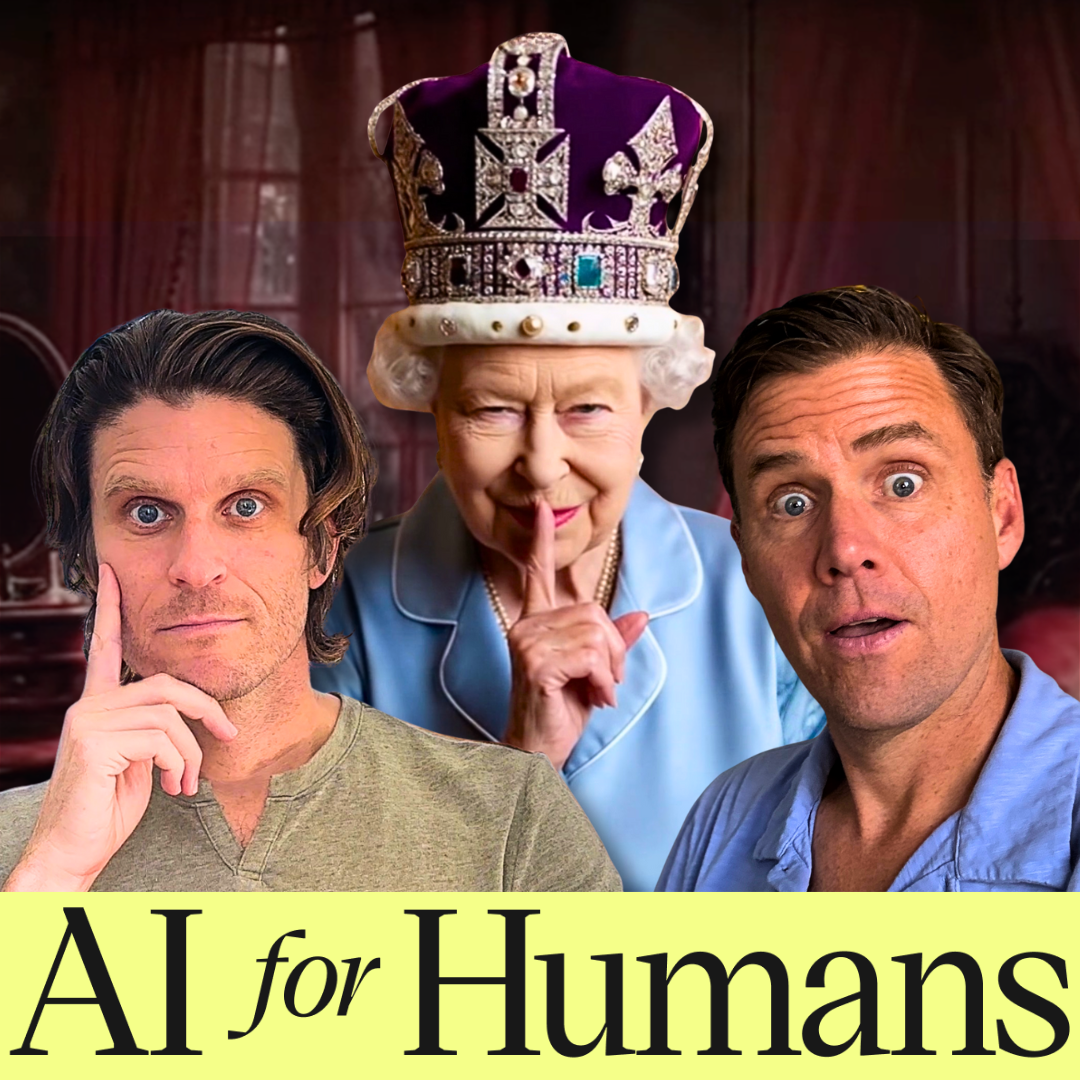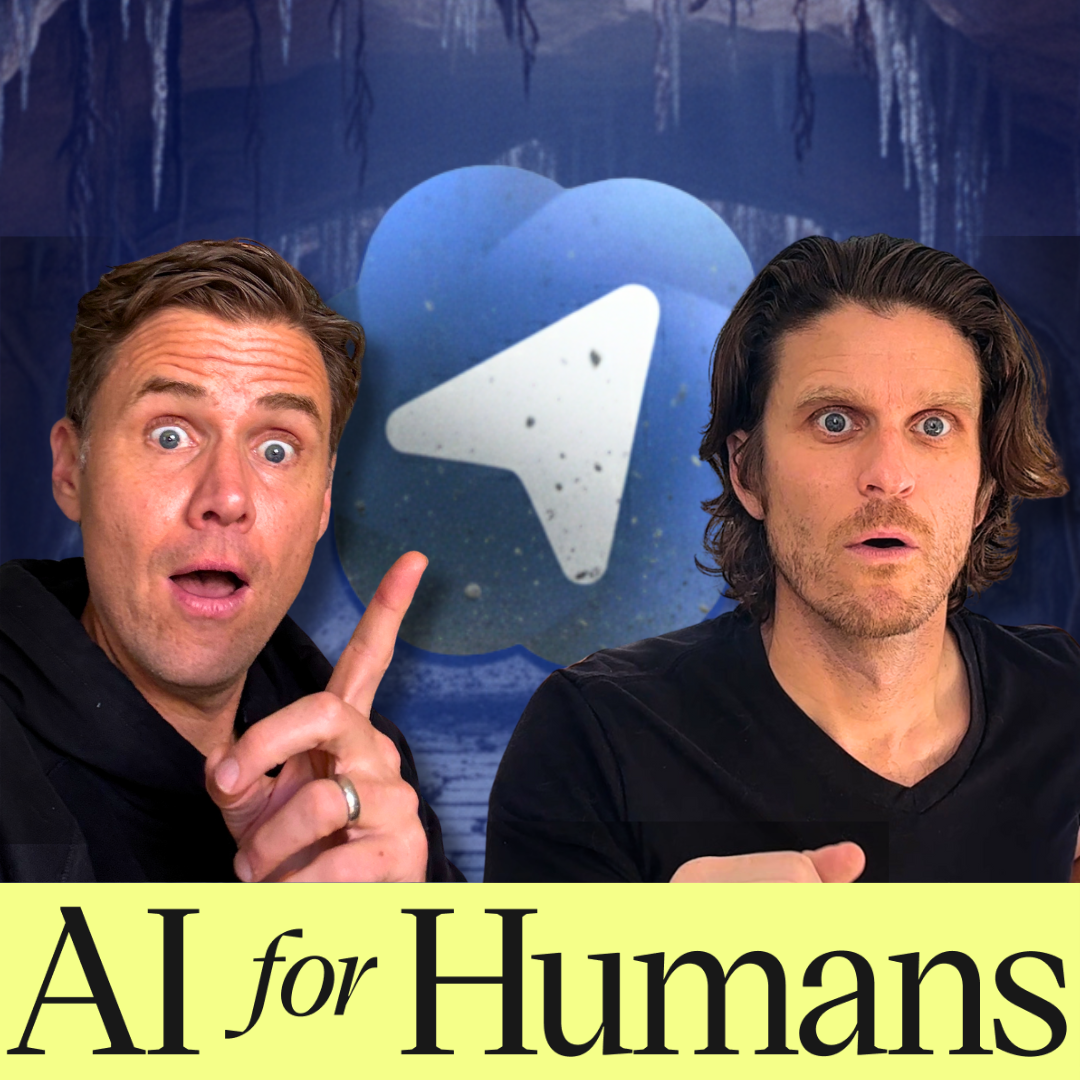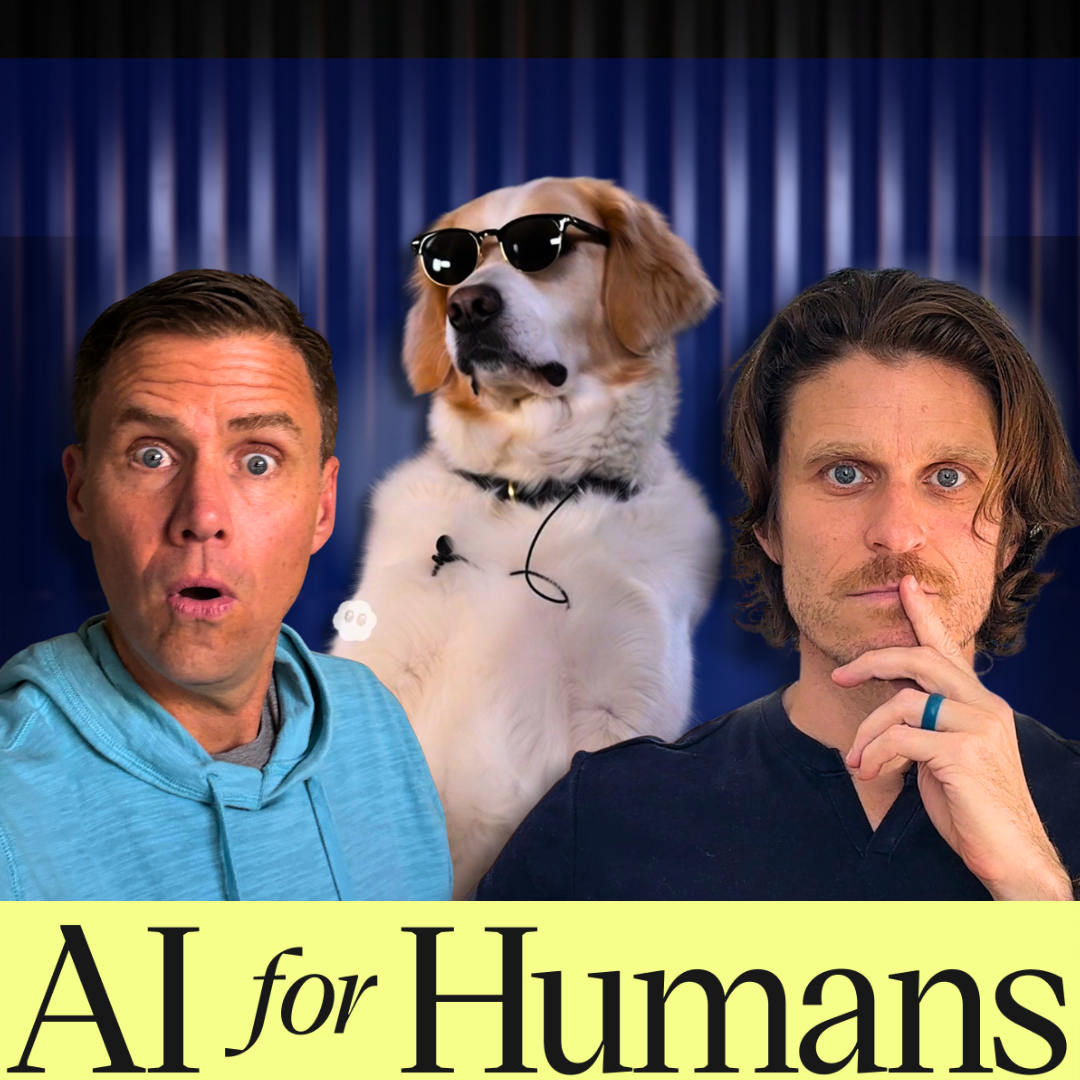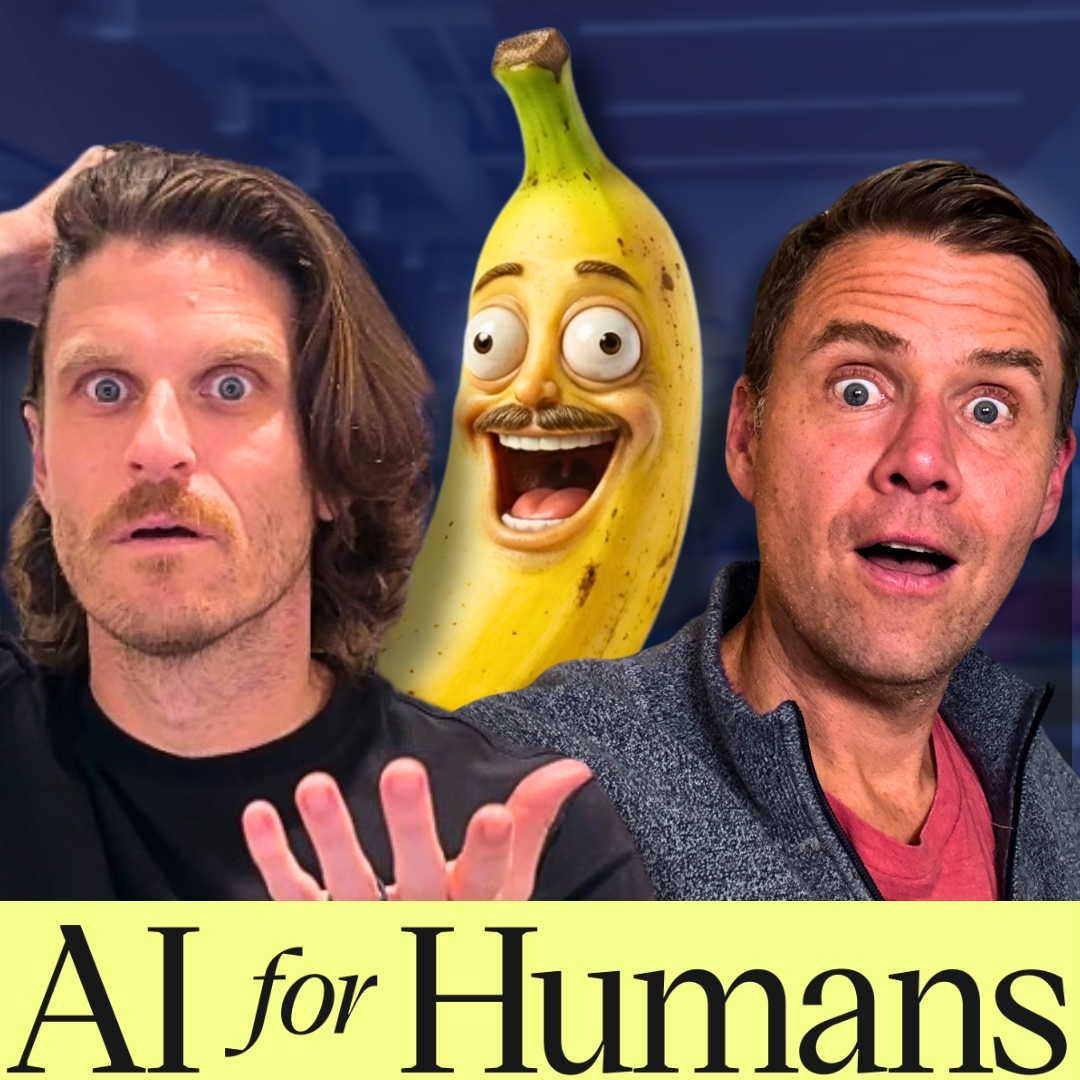OpenAI’s GPT-5 Leaks Show Us The Future (Of Next Week??)
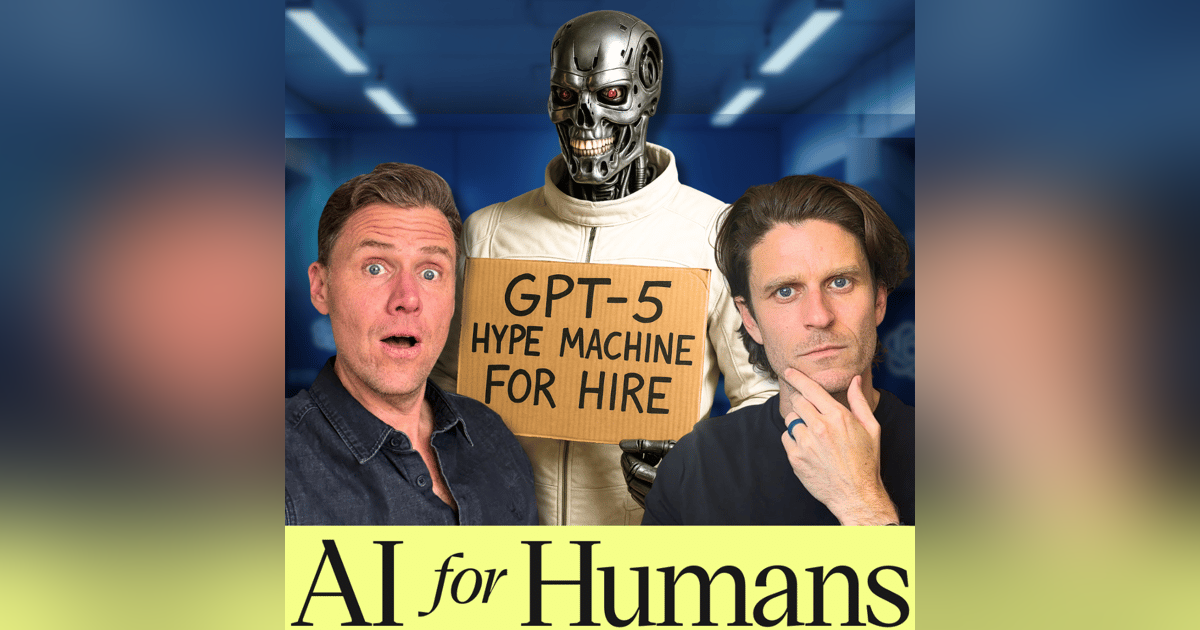
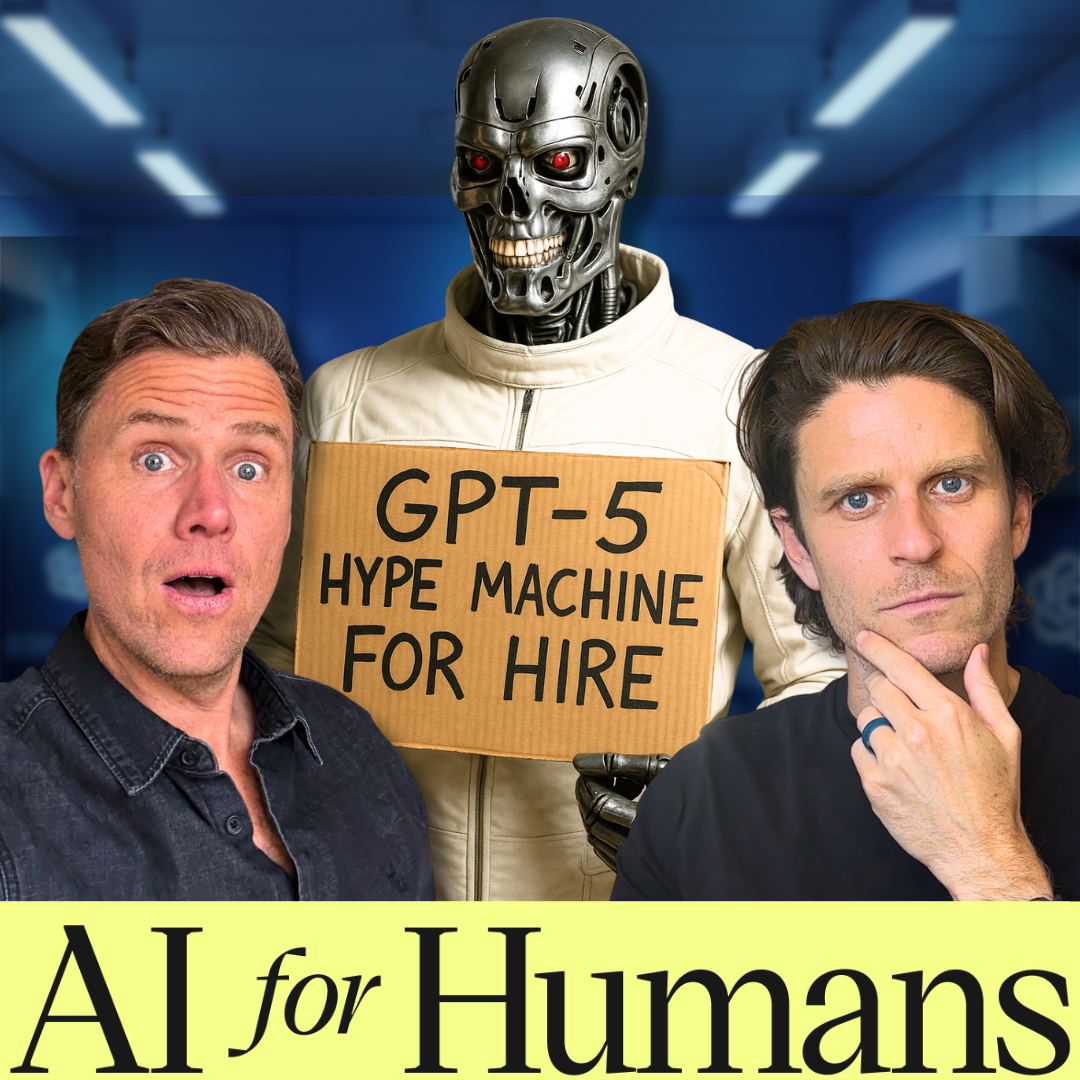
OpenAI’s GPT-5 is coming soon and it is…good?. Mystery models have been testing on various platforms that may show us the future of OpenAI’s newest AI & the future of the space.
Sam Altman’s company has been ramping up the hype machine entering next week when most expect GPT-5’s release (as well as a new possible Google model). Meanwhile, Mark Zuckerberg is talking up Meta’s personal Super Intelligence plans. Also, Runway’s Aleph & Ideogram’s Character mode give us more AI video tools while new emergent behavior lets you prompt Google’s VEO 3 in amazing ways.
And a very *spooky* new Robot Watch where we foreshadow our impending doom!
IT’S NOT SO BAD IF THE ROBOTS TAKE CARE OF US IS IT??
#ai #ainews #openai
Join the discord: https://discord.gg/muD2TYgC8f
Join our Patreon: https://www.patreon.com/AIForHumansShow
AI For Humans Newsletter: https://aiforhumans.beehiiv.com/
Follow us for more on X @AIForHumansShow
Join our TikTok @aiforhumansshow
To book us for speaking, please visit our website: https://www.aiforhumans.show/
// Show Links //
GPT-5 Finally Coming?
https://x.com/ChatGPTapp/status/1950675512625705337
Zenith, Lobster & Nectarine Models *Briefly* Appeared On LMArena
https://www.reddit.com/r/OpenAI/comments/1m9i0i5/gpt5_zenith_is_more_intelligent_than_o3pro/
Rumored To Be Great at Coding
https://x.com/Yuchenj_UW/status/1950763090968252582
One Shot Minecraft
https://x.com/BLCNYY/status/1949909724876722512
Zenith Coding Examples
https://x.com/SadAlbert10/status/1950237091985818034
SVG Pelican
https://x.com/benjilona/status/1950736111203954854
New Microsoft Co-Pilot Smart Mode Powered By GPT-5
Microsoft & OpenAI On The Verge of a Deal (Finally)
https://x.com/morqon/status/1950212329141879124
ChatGPT Arr to $12b, Anthropic at $9b
Zuck’s SuperIntelligence Labs Vision Video
https://x.com/AIatMeta/status/1950543458609037550
Someone at Mira Murati’s Thinky Machines Turned Down 1 BILLION From Meta
https://x.com/AndrewCurran_/status/1950242928917696751
Runway Aleph
https://youtu.be/KUHx-2uz_qI?si=-7BRYuPQ0juA9HGr
Examples:
https://x.com/c_valenzuelab/status/1950691579041124801
https://x.com/blizaine/status/1950007468324491523
https://x.com/ProperPrompter/status/1950721487419097467
https://x.com/ProperPrompter/status/1950002466474410400
Ideogram Character
https://x.com/ideogram_ai/status/1950255115753095307
Veo3 Hack: Write The Prompts On The Image
https://x.com/jboogx_creative/status/1949230927504371765
https://x.com/Ror_Fly/status/1950352402416115788
https://x.com/bilawalsidhu/status/1948844167603310660
QWEN New AI Models (Open Source + Sonnet 3.5 level on low power computers)
https://x.com/MaximeRivest/status/1951011344678846789
Figure 02 Autonomously Doing Laundry (this is WAY too quiet)
https://x.com/adcock_brett/status/1950685253447913798
Lume Scary Robot Lights
https://x.com/aaronistan/status/1949862617872478664
Unitree G1 Meltdown
https://x.com/TheHumanoidHub/status/1949187112018034825
YOYO IDE TOOL (nerd alert)
NBA2K With AI Filter
https://x.com/willahmed/status/1950246714411036874
AIForHumans121OpenGPT5SamAltman
Gavin Purcell: [00:00:00] GPT five is here. Sorta all signs are pointing to Santa Altman, dropping down our next gen chimney and delivering the goods. Next week
Kevin Pereira: we'll tell you about some mysterious models that are floating around. That might be GPT five. And guess what, Kevin? What? It's going to be a big deal.
Gavin Purcell: No, no. Now that's.
That's borderline hype beast and we are not hype beastie, especially Helen. Did
Kevin Pereira: you see the SVG pelican on the little bike?
Gavin Purcell: I did see the pelican on the bike, and we will show you the pelican on the bike, but more importantly, we will explain why this pelican on a bike is a big deal. Kevin, it's
Kevin Pereira: riding a bike.
It is riding the bike. Pelican. It is Gavin riding a bike.
Gavin Purcell: It's so good. Okay, back to me please. Let's mute Gavin. Alright, we've also got some massive releases in the video space. Runways a lift. Or aif, if you're nasty, is changing the way people are making media, and that's not an understatement.
Kevin Pereira: And Ideograms character will turn your fairly normal selfies into total thirst traps,
Gavin Purcell: plus [00:01:00] huge updates in the open source community out of China.
We've got the new line of Quinn models, which are very exciting because you can run them in airplane mode. Yes. Offline intelligence friends,
Kevin Pereira: and we've got some remarkable new robots that can do your laundry autonomously
Gavin Purcell: and might just have a public meltdown when you're not looking
Kevin Pereira: that. That's me after GPT five.
Kevin, this is AI for humans.
Welcome everybody to AI for Humans. It is another big week in the AI space. In fact, Kevin, we are on the eve of what might be the biggest week in AI in the last year. G. PT five is here kind of for now. Not really, but there have been leaks. Who cares? And who freaking cares Care. We care over over hype. Our audience cares.
Our audience over hype. Nobody cares. They, they only
Gavin Purcell: care because they wanna do a 240 point font and get some click bait. Let tell you something, lemme save you a click right now. Oh, eh, no one's gonna care. It's not gonna matter. [00:02:00]
Kevin Pereira: Well, let's just, let's just pretend they care, Kevin, for the sake of the podcast.
Okay. Let's pretend they care.
Gavin Purcell: Kevin, I am zagging. Yes. 'cause everybody else is zigging on saml. Yes. Right now. Yes. Understand. I understand. I gotta be honest. For good reason. We gotta get to the models which we teased at the top of the show. Yes. That are out there that people are claiming might be GPT five one of many flavors of GPT five and the results are genuinely jaw dropping.
Kevin Pereira: Yeah, I wanna start first though that the chat GPT App X handle has dropped an unusually weird, uh, vision of, uh, a Japanese, uh, OpenAI logo, which I guess if you use grok to translate has something to specifically, it says the image of the XPO from chat GPT app features a stylized design resembling a traditional Chinese Woo Fu.
Which is the five Blessings motif, Kevin. And the rule Rule is not a
Gavin Purcell: Yfu, which is Elon's Blessing. No, not a Wi Fu.
Kevin Pereira: That's actually Elon's project. That's right, exactly. The rumor is, is that we may get this next Tuesday, which would be [00:03:00] August 5th, 2025. There are two fives in that number. Kevin. We are talking some serious stuff, but yes.
Let us get to the, to the interesting leaks that have happened. And when we say leaks, everybody's listening to our show. The way that some of these companies will test these models is they will put them out anonymously, quote unquote, on websites like LM Arena, which is how you compare one model to another, and you never know what model you're gonna get.
So a lot of entrepreneurial people just spend a ton of time testing these models, trying stuff, and they saw a couple models pop up, Kevin, specifically, three new models people had not heard of, and they were already gone from Ella Marina, but this was. A Zenith model, a lobster model, and a nectarine model.
So all fun code names. If this is opening eye, all fun code names. And the theory is here that this might be GPT five, GPT five Mini, and maybe a GPT five nano. So these are possibly, again, we are in unsubstantiated rumor territory here. Opening eye has not said something officially other than their weird symbol to start with.
Kevin, have you [00:04:00] seen some of these results? It's pretty impressive actually.
Gavin Purcell: I have, and I think we're gonna dive into some of them, so all the listeners and viewers will get to see them as well. Was there any indication that one of these might be a reasoning model? Gavin, was there anything about thinking on this?
Was this the Zenith model?
Kevin Pereira: The Zenith model is the one that it seems like had reasoning behind it, which is why that feels like it might be a GPT five model. Now again, there's been all these things that people have talked about where, uh, you know, with GPT five, what we have covered on the show is that it sounds like there will be some form of a hybrid model where it will quote, unquote, know when to reason or not.
Gavin Purcell: Yeah.
Kevin Pereira: People have shared. Possible fake, possible real screenshots where you can turn on or off reasoning on something. Yeah. Like the way these often roll out is like you, you may have tested it and you don't even know, but the Zenith model seems to be the one that has most people excited. I saw a lot of really interesting coding examples.
Um, and when I say coding examples, it's not just like a page of code, it's like what it can actually make. With code in one shot.
Gavin Purcell: Examples I, I mean, let's talk [00:05:00] about the Minecraft example real quick. Yeah. 'cause that was the one that had me stop in my tracks. It was basically like, Hey, just go and code Minecraft.
Yeah. And in one shot, meaning that was the prompt, it returned a browser based, fully playable game where you could. You know, navigate a pixelated, blocky 3D world. You could jump, you could break things. Uh, there was like a sprint functionality, there was basic inventory. There was day, night cycles and, you know, uh, you could make the argument, well, listen, a lot of this code is out there.
It was probably swept in through something else on a website someplace. But that argument was made of things in the past. It speaks to its ability to put all of the pieces together and get. Interactive controls and 3D graphics and make it playable and put intelligent systems together in one prompt, one shot.
Kevin Pereira: Yes, yes, yes. And this all follows up The idea that we've been hearing from the heads of these AI labs for a while, that it is, these models are going to get much better at [00:06:00] coding this year. And Kev, I think the big thing, there's a, there's a guy who we followed for a long time on X, who goes by Yin Jin, and he's sometimes has been right with these thesis and he's connected maybe in these spaces, he said.
Heard from a little bird at OpenAI. GPT five is finally better than CLO at coding, not just on benchmarks, but in real internal use over the past few days. If that's true, anthropic can't stay quiet for too long. Claude five has to be released sooner. I dunno if that's the case. 'cause I think, as we said on the show before.
It does feel like the GPT models are like the start of a new cycle and maybe the anthropic ones are the end of a
Gavin Purcell: cycle. There's also been some other models that have popped up. There was like a horizon model and a summit model. Basically, it would make sense if OpenAI was testing a bunch of different variations of this.
They might also be, uh, testing older models that don't do the things that we believe GPT five will do, just to create fear, uncertainty, and doubt. Also, people can post whatever they want on the internet. Lemme be clear. Mm-hmm. So there might be some stuff floating around that is complete bs, but it does seem like there's an ex user by the name of [00:07:00] Sad Albert, which I love.
Oh, good. Name. Some tests I have done before Zenith rumor to be GPT five from L Marina disappeared. He has a couple little examples, um, and. You know, there's a, there's a test of, um, putting a bouncing ball with physics inside of a, a piece of geometry, like a shape and letting it go around and bounce.
People have been doing tests like this with multiple shapes and multiple balls bouncing around, and then the, the, the balls are different sizes and blah, blah, blah. The ball physics are off the chain. Gavin, the point is. If it's not GPT five, something seems to be making really incredible coded experiences.
One shot and very quickly, like people remark about the speed that this, this model generates things. So if it's not GPT five, whatever the hell it is, is a reason worth getting excited and maybe a reason getting a little hype beasty.
Kevin Pereira: Yeah, so it's not, and and by the way, let's just be clear, like it's not just these models that have kind of signaled this thing.
The other big thing that's [00:08:00] happening is that, uh, Microsoft Copilot has launched a new smart mode and the Verge is reporting that in this smart mode that there are probably GPT five turnons. And if you remember, the Verge also reported, I think it was last week, that it would be coming out in the beginning of August and.
Microsoft and OpenAI seem to finally be on the verge of a deal, which is something that has been dogging them for a while. And if you remember, there was a whole argument around the idea of like what a GI was and whether or not they were gonna allow Microsoft to have the full percentage of the company that they owned originally.
There seems like there is a deal happening. So all of this is pointing to one direction and even so at the same time, Kev, from a business standpoint. OpenAI dropped a little piece of information that I'm sure was probably seeded to the information this came outta the information that they are now doing $12 billion of annual recurring revenue at the same time as Anthropic is doing $9 billion.
These companies are scaling very, very fast. Yeah, and in some ways I think this all leads into the idea of like, are we gonna go from. [00:09:00] This moment where we have like this kind of not sure what the next step of AI is to a moment where like we really see what essentially could be the future of like a bajillion different things in our world.
Right? Like meaning that if these tools get this good at coding
Gavin Purcell: mm-hmm.
Kevin Pereira: They can come for a lot of other things.
Gavin Purcell: The parallel that we've drawn on this show before. 'cause, uh, it's hard to go, like if someone is casual, uh, to this space, Gavin and listening to this pod right now, and maybe they've poked at chat GPT, what does going from four to five really mean for them in their day-to-day?
What does it really mean in the life? And we are at the dial up modem phase of artificial intelligence. Yes. If you're, uh, an old head like us and you remember that, right? We are, we are dialed up mode. What bond rate are
Kevin Pereira: we at? Which bo rate right now?
Gavin Purcell: 28 8. That's not bad. I was thinking we were closer to 12, maybe 56 K.
Oh, I, I think, no, because Well, 'cause I was gonna say is I think we're on the precipice of like early broadband. Got it. That makes sense. Yes, that makes sense. We're, we're about to hit the broadband phase, so what does that mean? Well, you know, your GPT-4 that you have access to that [00:10:00] sometimes gives you really great answers and other times fails miserably.
Yes. To do anything can suddenly now go off and do work for you for minutes at a time, potentially hours or days or weeks at a time and come back and deliver you a result, um, for the quicker things. It's going to be lightning fast for the distillation of these models that come down the line. Your smartphone, your eyeglasses, your, all of the things will have intelligence built into them as well as these, uh, frontier models move everything forward and everything trickles down in the end.
So it's like, yes.
Kevin Pereira: Also, Kevin, that we cannot forget. Recursive learning is a thing, and that is a thing that is a thing and an important thing to, to
Gavin Purcell: remember. They, I, I got bad grades because I refuse to learn cursive. So why does this matter?
Kevin Pereira: Well, you know, we want the ais to have the best handwriting they can.
So when they present us this statement that says we are no longer useful in their lives, we can read them and fully understand. Oh, so our chicken death note will be in calligraphy? Yes, that's exactly right. No. Oh, [00:11:00] wonderful. Of learning. We're no longer needed. There was a really interesting thing this week where it kind of like highlighted, I think it was ethanol who tweeted the out, that all three of the major leaders, Zuckerberg, Sam, Altman, Dario, Modi, all the people that are kind on the edge of AI in some form or another have all mentioned, and Desis AB have all mentioned this idea that they have started to see recursive learning, meaning that like these, these systems are starting to like help program themselves to make themselves better.
That is the scale up moment. If you think we've been going fast already, that is the moment that that all this happens at and like. I think come next week, we'll, again, we'll get a sense of understanding of like what sort of leap we have really taken here.
Gavin Purcell: Yeah. Well, speaking of the Zuck, uh, there was some videos made this week about Super intelligence and Meta's future, and I saw them posted everywhere.
Gavin? Yeah, I I saw a blog post as well. I read it, I read the blog post. I still don't know what. I read or what it means though.
Kevin Pereira: Yeah, take a listen to the, like the beginning of it. Let's play a little bit of Zuck. 'cause Zuck loves these new videos where he's like right in the camera looking [00:12:00] at us, telling us something really important.
Alright, you ready? Hey everyone. Yeah.
Mark Zuckerberg: I wanna talk about our new effort. Meta Super Intelligence, by
Gavin Purcell: the way that All right, ready? Was Zuck, not me. I'm gonna play it again. Oh, I thought that was you. Yeah. No. All right. Ready?
Mark Zuckerberg: Here we go. All right.
Gavin Purcell: Ready?
Mark Zuckerberg: Alright, ready. Hey everyone. I wanna talk about our new effort, meta Superintelligence Labs and our vision to build personal super intelligence for everyone.
AI keeps accelerating, and over the past few months we've begun to see glimpses of AI systems improving themselves. So developing super intelligence is now in sight, but there's this big open question about what we should direct super intelligence towards. Hmm. A lot has been written about the scientific and economic advances that AI can bring.
And I'm really optimistic about this,
Gavin Purcell: but have you thought about big wis with giant vampire wings and fangs that have your initials on them? One bite. I have not thought about it. You'll be not thought about that. I'm just asking. Okay. All thought about, let's hear what Z say.
Mark Zuckerberg: I think an even more [00:13:00] meaningful impact in our lives is going to come from everyone having a personal super intelligence that helps you achieve your goals, create what you wanna see in the world, be a better friend, and grow to become the person that you aspire to be.
Maybe
Gavin Purcell: it has the
Mark Zuckerberg: biggest in the
Gavin Purcell: world, Gavin. It maybe it its wings excitedly every time you come near the computer. Maybe it force feeds you personalized ads like fo gra
Kevin Pereira: frais. Wow.
Gavin Purcell: That's how they, where they force feed ducks. Do
Kevin Pereira: you get frog? Yeah. Frog. Well
Gavin Purcell: that's what I'm saying's. They're gonna force feed you your wife who's gonna have a, a wooden dowel that's gonna jam data down your door.
These are all
Kevin Pereira: artificial things, so just everybody at home is listening. We don't support frog fois. We don't support dowels, we don't support wooden ducks. So all that's in the same place just to make, but we do support big old. What was interesting to hear about this is. Mark is pitching a personal super intelligence.
Yes. Which I think is an interesting term because I've never connected super intelligence to a personal thing that before. I mean, I understand what [00:14:00] he's getting at here. I guess the question is, we're entering in this phase again and people have already started and Dario Modi had a, had a clip this wicker.
He was talking about how none of these terms make sense anymore, which, okay, well you were also part of the person that brought these terms into our lives, but like. What is super intelligence and what does it mean? I don't think of super intelligence as something that's gonna be my friend. I think if super intelligence as something that's like going to hopefully work at a very high level and not just hand me a light beer when I need to have like a, a partner to watch the football game with.
I, I don't know, like this is the idea of personal super intelligence feels like an oxymoron a little bit to me. I dunno what your thoughts on that were.
Gavin Purcell: Uh, you know, I haven't. Really thought about it in that way. And now that I am, I, I, I'm realizing I did have this weird sort of, I maybe shortsighted this bias that like a super intelligence was going to be this layer over the globe.
Yeah, me too. That maybe a handful of governments would have access to and they would run their experiments and I would get grok six, you know, I would get the anime fu version of it. Yes, [00:15:00] yes. It'd be distilled down, but yes, I know you're saying yes. But yeah, and, and look. Great. Yeah. Let's all have access to a super intelligence.
I I, I'm gonna maybe take advantage of 5% of what it's capable of. Yeah. But sure. Let's all go ahead and have access to it. I guess that, that is nice. I I do worry about only a hand handful having access to Sure. To the best intelligence. So that's a, a great vision. But he, the reason I said like, does he actually say anything, and this was a criticism that I saw lobbied by others, is that.
What, what is that? What do you, what is it gonna do? What, what is it actually gonna do for us? How, how is it gonna, and if we all have it, is it actually a super intelligence or is it just that's, that's table stakes for everyone. You got
Kevin Pereira: my brain moving around it. It's like, if we're all super intelligent, is anybody super intelligent?
What makes it so super anymore? Hold on a second. Who's the super duper intelligent one? That's what I'd like to know, but I do
Gavin Purcell: like, I think it's interesting. Yeah. For, for, for healthcare. Uh, yeah. A super intelligence in my pocket that is monitoring my vitals and helping [00:16:00] me live the healthiest, best life.
Like, oh yeah, that, that's cool. I dunno if it needs to be a super intelligence for that. Well, I, you know, I don't know. I just like, what, what are, what are your plans? What's it going to do? Because, um. I, you know, I wanna believe that it's going to lead to amazing things. I just, yeah, I just feel like it somehow leads to more targeted advertisements and more in ones.
Yeah. Well, I think that
Kevin Pereira: that's a really important thing to think about. And also, like, there was a kind of a, a weird news story this week where supposedly somebody at, uh, Mira tis thinking machines, um, turned down a $1 billion offer to join meta over multiple years for this exact reason, maybe that they didn't want to be part of Meta's vision of this thing.
And it does start to become a question of like, where you have like. Five to seven people that we are gonna be seeing as like potentially in charge of this technology that could like change the entire world. And it's weird to think about who do you know and what do you know about their backgrounds and what do you know about the choices they've made before?
And to your point about like target advertising, like. Well, we know Mark Zuckerberg built a big business in that [00:17:00] space, right? Like we know that. He understands that. So
Gavin Purcell: anyway, Kevin thought experiment here. What number would it take to get you to walk away from AI for humans and our friendship? 1999 and, uh, six month in six month increments, maybe.
So six installments of 1999. USD.
Kevin Pereira: Yeah, it's fine. If you wanted to pay me like every other month, that's probably fine too. Like, it'd be, we could be. All right.
Gavin Purcell: Well, that's a, a uplifting piece of information to have. Um, nothing would make away, didn't need a comma, but let me say, nothing would make me walk
Kevin Pereira: away.
Gavin Purcell: You don't have to spend a dime to get Gavin to walk away, but you can spend a single click to brighten his day and bring us closer actually, which is can, which is a wonderful punishment for Gavin. Oh, does that
Kevin Pereira: bring us closer?
Gavin Purcell: I'm saying like, and subscribe is what I'm saying because the more this thing works, the closer.
Sir, unfortunately for you, we get Gavin, so, uh, please. That's right. You are the only way we grow this endeavor. Each and every week we get on the promo pony and we beg and we plead. And this week is no different. Click subscribe, click like, leave a comment. It helps [00:18:00] us with that sweet, sweet algo juice. So please, that's right.
Give us some love and thank you. I, I'll, I'll also point out Gavin, we are now two weeks into our not having a million dollar plus super chat on YouTube. Oh, you're right. I'm shocked. You're right. I'm shocked.
Kevin Pereira: I
Gavin Purcell: don't
Kevin Pereira: think we're gonna go three weeks, but it's okay. Our audience is, is, is showing restraint, which is fine.
I know there are multiple billionaires out there who have ha kind of hovered their finger over that giant super chat space. Yeah. If it wants to be you just know that we will not feel bad about you doing it. We'd be happy to have you. Go even as low as a hundred thousand. It's totally fair to do that if that's a place you want to get at.
So don't do that to yourself.
Gavin Purcell: Don't let, don't do that. Hang out. Be the first to limp in at a million. And I know a bunch of our, our other whales are on the sidelines wondering if they should limp in with two mil to look better, just to get the, get the, we gotta get this ball
Kevin Pereira: rolling. So let's keep going.
There's some huge news in the AI video space this week. We're gonna start with a big announcement for Runway, runway aif, ALIF ola, ef. We don't know exactly how you present it or pronounce it, but. What [00:19:00] is cool about this, it is a, it is a chat-based natural language interaction tool with your images or your videos to tell it what you want.
And Kevin, this is a very cool tool. I will say I had some hands-on experience with it. We'll talk about a little bit, but like the examples that I have seen come out of this are really interesting. Crystal Ball Venezuela, the guy who is the CEO of Runway, obviously is out there tweeting some really interesting ones.
Did you see the one where. Um, it's the dance from Pulp Fiction and they put all the different Yeah. For audio listeners out there, this is the scene with John Travolta and Uma Therma dancing and they put them in like the snow in a sandstorm. The sandstorm stuff is so fascinating 'cause it does a good job of like making it feel like there is a sandstorm, but you can kind of still see the images.
Mostly keeps facial recognition. Like there's definitely some stuff where it doesn't, but this is a tool that is as good at manipulating images and stuff better than I've seen yet, which I think is pretty cool. The,
Gavin Purcell: uh, un like the, I've seen a lot of montages, which have short clips, [00:20:00] which, you know, I, I, I want to, I want to like dive in and see like longer form scenes, but the understanding of physics and weather, world modeling, lighting are really, really impressive.
And so, you know what, some of my favorite examples, they'll take a scene and they'll style transfer at six different times. So yeah, you watch somebody. Uh, just walking around and then suddenly they're on a giant sand dune or they're walking on a spherical earth in the rain or the snow or the what? It just, it.
This is, this is the kinda thing where we talk about like one person making a Hollywood film. Yes, yes. You know, like this is the kind of stuff where it's like, oh, you want to be flying on a land speeder? Well go grab one of those Amazon cardboard boxes and kind of half squat on it, and then tell the machine that that's a horse, or that's the land speeder, or that's whatever you want.
And it really seems to understand that context and transfer the video.
Kevin Pereira: What I'll say is, like, one of my favorite things about this tool is, is that I've just seen so much creativity come out of people using it. Like, um, proper Prompter is a, is a person we like on X who shows a [00:21:00] lot, a bunch of examples, but if you go to their, um, feed, they've shown a bunch of different ones and like.
You know, he had a thing where he, he retweeted somebody called the Artist Journey and it's this really interesting thing where they took like a Twitter screenshot and they made like a video look like it was coming to life and then it cuts over to the same thing in person. Like just really cool ways of using things in AI video they wouldn't expect.
The other thing, Kevin, I do like about this, and I don't know how a long they'll let you do this, but. Runway used to be really weird about letting you upload things that were recognizable celebrities or were scenes for movies. And it seems like they have really loosened the rules on this for right now at least, and maybe that they learned that from chat GPT and the O Glee gate sort of launch, where like in, maybe in the very beginning you open the floodgates so people can do stuff.
But there's been a lot of interesting IP stuff. There's a very funny one that proper prompter made. Ksi from Game of Thrones with the Starbucks Cup in front of her. And then it cuts to a bunch of other different scenes where like she's interacting with other ad things and like again, facial structures really [00:22:00] solid, really, really interesting use case.
And I think it is available for everybody who is a runway subscriber. Kevin, I did try it and I went in there and I got some, uh, I had some interesting experience with it and I will say I didn't spend a ton of time with it, but I wanted to see. Could I upload a photo of myself wearing a turtleneck from New York City and I said, put me in a tropical location, and it created a version of me with a tropical background, kind of a weirder, slight, slightly changed face and weirder body.
Then I asked it to give me an over shoulder of the view of a monkey like I was. There was a monkey opposite for me, and it did that. Then I tried to do a couple other things where I flip flopped around. Like what I wanted to try to do was get like a. Reverse shot where the monkey and I were both shaking hands with the ocean in the background and it really struggled to do some of this.
So the only reason I say this is like, again, this is no knock against runway. The stuff we've seen come out, people who are very good at this, is it remarkable? It's just another one of these tools that probably takes a little bit of time to get used to the last image kind of may. Like with chat, GPT image, uh.
Clearly my face [00:23:00] has changed. Right. When you look at that rip of, of things like, so I wonder if it's the same thing as cha PT is where like the first one is still gonna be the best that you get out of it and then like trying to degrade, downgrade halfway it gets further. Exactly. Yeah. Yeah,
Gavin Purcell: yeah. Well, I mean, runway is not the only one that's trying to do this.
Right. We had Higgs field with the so yes. Add on a few weeks ago that we covered and Idio Graham, which was one of our favorite text and logo generators for a long while. Yeah. They have a new thing called Idio Graham character. Yes. And they're claiming it's the first. Character consistency model that works with just one reference image.
Gavin? Yes. You give it one image of yourself and then you can reimagine yourself in stunning photorealistic pitch. Perfect. I'll say pixel Perfect accuracy. And you tried it out. Yes, I tried it out.
Kevin Pereira: It's, well, first of all, we should be clear. It may be the the best in their words, but we have seen versions of this for quite a while, right?
Like single image L Laura's like training ability, like there's very many companies. This is pretty good. Like I [00:24:00] actually used a, a, the same picture. I uploaded it and I started to ask it different things. You'll see in the examples that I shared here is that like there's an example of me in a video game, which is pretty good.
Like I made it, I actually try to make it like a nineties style, like kinda like almost Skyrim style game. There's an a cartoon image of me on top of a ball, but the most important ones I think is I tried to get an image of me. In a bleach, blonde, bleach, goatee kind of guy, FII chef outfit. And it kept turning me into some sort of weird thirst trap guy.
And I don't know what these images are. These are not what I asked for you. I think you survived
Gavin Purcell: till episode three of building the band. That's what I'm seeing. I say photos say That's exactly
Kevin Pereira: right. So like they're very boy band esque. My face has kind of been a little like cleaned up and thinned down and like some other things going on, but like, listen.
If, if you're a paid member of videogram, again, you have to be paid. You can do this with 10 different characters and it's worth playing around with. So I, I spent a little bit of time with this. Again, it's just making these tools that used to be harder to access, available for more people. So it's a very cool [00:25:00] thing.
Um, and Kevin, in that same vein, there's another interesting thing that came out with AI video, which is that VO three, which is still my favorite video model to use. There's somebody that found a hack basically for it, that if you upload an image and you write on the image itself, what you want to happen in the video, like you actually literally say, okay, circle this area.
These guys do this. Circle this area, these guys do this, that it works really well to give you direction in the video. So this is just a cool hack. Um, there's some great examples here from Jay Boo's, uh, underscore creative when he, uh, created an image of a, of a, like what looks like a SWAT team that is then busted in on by an alien.
And you get a sense of like how it works. Just some really cool ways of using ai. But it's a cool, I I love that example 'cause it's
Gavin Purcell: like this three quarter perspective. Almost like a action RPG style. Yeah, like a a, what is it, excom kind of game of like the SWAT team. Totally. And he literally says, alien bursts through a wall.
These guys get knocked back, these guys start shooting. And it works for camera control as well. Yes. So there's another example. [00:26:00] Rory Flynn has one of a, of like a, a, a dream card drifting around and a a corner. And he's drawing arrows that dictate, okay, the car needs to go here, and then phase two, it needs to drift here.
And then three, the camera needs to follow it around and the model just does it. And. We talk a lot about what our interface is going to look like in the future for these tools, right? Yes. And if it can handle this, there's no reason it couldn't handle natural language input as well to just tell it, Hey, I want the camera to push in here and I want, you know, draw with your finger and all that stuff is just, it's wild that this is like an emergent behavior that someone just sort of discover.
Yes. This wasn't like a big, Hey, this is a, that's the
Kevin Pereira: part that's most interesting to me is like, this wasn't planned for by the team. Like this was just something fig, somebody figured out was a cool way to do it. And emergently they were like, oh, this actually works. I can't believe it
Gavin Purcell: works. I wanna briefly, Gavin talk about the Quinn line of models, which are getting attention, I think in our circle, but haven't really shattered through like, uh, like the deep seek stuff did back in the day.
[00:27:00] Um. This is an incredible line of models. It's several different models, um, which are very, very powerful. We're talking like GPT-4 oh level in some ca cases like Claude Sonnet level for coating, and you can run many of them locally. Uh, you can run them on, people are running them on MacBook Airs that have just an ounce of ram.
These are distilled versions of the models. They're not like the all powerful ones, but when we talk about like. Intelligence in the home, trusting these models with your sensitive data. Your, uh, you know, your, your household, uh, private metrics and all that stuff, your financials, your, your medical stuff, like this is what we're talking about.
These models are now like. Basically performing at the frontier of what we have now. And yes, something better, more powerful will come out tomorrow, but today this is very, very impressive. So if you've been sitting on the sidelines wanting to try coding or feed your medical data into something and you've been, you know, reluctant to give that up to one of the bigs, now is the time to leap in because these models can be run [00:28:00] super cheap.
And again, you can run them on-prem. You can run them in your house locally. Kevin, can I give you a compliment? Of course you can. I don't know if you're capable of it, but
Kevin Pereira: you're welcome to. Oh my God. Come on. Give me a break. I wanna say that Kevin was, uh, we talked about this yesterday. Kevin and I are in the same town.
Weirdly, you would think we are across the world, but no, we are in the same town. We're just in our homes right now recording this. Um, Kevin was helping me understand a little bit about like how important local AI is to him, and I think he really kind of brought it in front of my brain mostly because the truth of the matter is we are all gonna like, continue to use AI as it gets better and better and better.
But at some point. We are not, uh, mathematicians who, we're not PhDs in math. We are not like advanced, crazy advanced in science. Maybe at some point, who knows, maybe we'll get an advanced degree in Geology U or I if we go back to school, but. What's cool about these open source models is they are going to follow the pathway of the state-of-the-art models, and eventually these little tiny models will get as good as the state of the art, like two rounds from now.[00:29:00]
Then you have like all of this power that we are gonna see, say, you know, in 2028, let's say the whatever the state of the art is then is gonna be. Massively farther than we are now, we hope. But then the 2028 model that we can have locally on our phones is gonna be really, really good. That's really exciting.
And I think if these keep improving the same way that the state-of-the-art ones do, do, that will change a lot of how we just live our everyday lives. So I, you brought, you brought it back home for me, so I appreciate
Gavin Purcell: that. Well, thank you, sir. And I think that to contextualize that just a, a little bit more for folks like, I don't know that I, I mean.
At some point, I'll probably upgrade my laptop again. Maybe I'll get another gaming pc. I don't know. Okay. I'm, I'm pretty lucky I get to think about those things. But I will definitely at some point in the future be buying an AI accelerator for the home. There's gonna be a dedicated device that I'm going to spend, uh, a decent chunk of change on that is just gonna generate tokens for me and whoever else happens to be over, because that can mean.
Crunching my medical data. That can mean generating [00:30:00] silly videos. Yeah, that can mean thinking deeply about a project that I wanna do, helping me get my day job done. I don't know what, I don't know about the capability of these things in the future, but I know that we're going to be accelerating them. You and I and everybody watching and listening to this, we're gonna have things dedicated to making that faster in our home, which is kind of wild.
Kevin Pereira: It's incredible. It's incredible. Speaking of things that are gonna be in our home, Kevin, it's time for the Return of Robot Watch.
Gavin Purcell: Spooky Edition
Kevin Pereira: Robot Watch. It's Robot Watch. So yes, Kevin. I've referred to this as the Robot Watch, spooky edition because there are a few things in here. That start to make robots get you, you know, that song, uh, things that make you Go, Hmm, you remember that song from the old nineties? Yeah. Yeah, I sure do. That's how I started to think about the robots in this.
We're gonna start with the robot though. Figure O2 uh, has a video. Brett Adcock, the CEO of figure O2 tweeted out a video of his robot. The uh, um, the Figure O2 robot [00:31:00] autonomously doing laundry. It's just sitting there, kind of squatting next to his dryer, pulling stuff outta his dryer. But Kevin, I want you to play it for our audience and I want everybody to just listen to the sounds you hear in this video.
Alright. Figure two hum. And robot do the laundry cock house. What do you guys think? Honey? You wanna fill that in there?
Gavin Purcell: I think I'm subscribing to servo A SMR right now. Gavin. That's right. 'cause that's all you hear is little z.
Kevin Pereira: That is so scary to me when you hear that sound because what I would rather have it do is like play like a little circus music or something that makes me understand that it exists.
What it sounds like is a silent killer that is doing my laundry for right now. Do you want it to sound like a Chevy,
Gavin Purcell: a Chevy Bolt that got put in reverse? Like do you want it to always make a low hum? I think that's exactly, so you know, the robot is there.
Kevin Pereira: Yeah, in some, I wanna have some version of that.
'cause you can imagine what if you're sitting in your bed and you hear that little wis, that little sign of that circle, the last thing you
Gavin Purcell: hear on this earth, Gavin will be, [00:32:00] and that's your neck as Ital. You. That's right. It's going to Steven Segal you. That's right. The, the, the robot I, we should point out is not being teleoperated according to Brett.
It's just moving autonomously. Right, it's running. Yes. Their neural network thing. It's a system that they call Helix and while the robot is loading one piece of laundry at a time from the basket into the dryer, it looks like he has his daughter stuff new laundry into the basket, which is like, that's a confusing the robot that happens for a reason, but the robot adjusts and continues doing the thing.
What I really wanted to see was the end of the task. I wanted to see it close the door. Stand up and just kind of wobble out of frame. You mean taking the humans out? Is that the end of the task? No, I didn't wanna see it load the child into the dryer or No, no. I'm saying that like when you watch the video, it's sort of like the, the robot sort of finishes and then Brett pans away and we have no idea what happens on the other side of that.
But I wanna know how much of that was an on rails. Like, okay, you're in the perfect position and now it's time to execute [00:33:00] laundry command. You know, like how much was that? What, what did it, what happens on the other side of that? I'm just curious. Yeah. You know, robot,
Kevin Pereira: robot companies give such good video, but like it's interesting to see when they're in production and in the world.
That's why in some ways those RBO videos are so interesting to watch because like you're actually seeing a unitary robot actually walking around. Moving around. Yeah. Yeah. But so speaking of scary robots. There was a video I saw from a company called Loom and Loom when I opened this video up, I was like, oh, this is, I dunno what this is.
It's like two stands that have lights on them, right? Yeah. And there's these two light stands, and what they do is in the video, like Florida ceiling
Gavin Purcell: stands, let's be clear. Like these are very tall. Tall, like single look, like a bamboo stick sort of thing with a lamp shade on the end.
Kevin Pereira: And then in the middle of, I don't know, when my worry was, I'd be asleep and this would happen in the middle of the night.
They both turn into these like robot arms that reach over the bed and supposedly do like folding of clothes. But Kevin, speaking of spooky edition, do you know what I think those two robot arms would be doing? Zoo cut me [00:34:00] wide open in the middle of the night. That's what's happening, and I feel like we are setting ourselves up to put killer robots in our bedrooms right next to our bed.
So if you haven't seen this video, go check it out. It's probably not as scary as I'm making it sound
Gavin Purcell: out. It's actually you require folding. Must be folded. Yes, exactly. Please stop.
Kevin Pereira: Contorting me. Stop folding me. Um, well, and then finally in our robot watch we have, speaking of unit tree and rebo, there was a unit tree G one that had a full meltdown.
And sometimes Kevin, it's important to remember that robots are not as advanced as they see. But this also just reminded me, when you watch this video, it's a, it's a, it's a unit tree robot kind of hanging out. And it does that thing where sometimes unit tree videos look like it's gonna do. There's an old dance move, I can't remember what it's called, where you kind of go on your back and then you flip up again.
You know that moment where like it looks like it's starting to do that and then like it has like what some sort of a freak out and on the ground it turns into.
Gavin Purcell: Have you ever been at a Denny's on a Saturday afternoon and you've seen the toddler that doesn't get tablet time? Yes,
Kevin Pereira: that's exactly what [00:35:00] this is.
It
Gavin Purcell: fussy toddler mode. It is thrashing its little robit legs around.
Kevin Pereira: That's right. So I, it's just another example of like, we are outta the point where these things are in any way con, fully controllable. And it made me feel a little spooky again, that like, if it can still flip and flop around on the ground like that.
Maybe, uh, we don't exactly where, what's going on here,
Gavin Purcell: where is like the governor guardrail system for these things that can detect, like even if the main system interesting has gone down or going awry, you should never allow your little servos to operate at this speed or at these degrees or whatever.
It should just be a fail safe and shut it down. Yeah, but nope, we got thrashing robots and your daughters. That's really interesting. Go in the dryer.
Kevin Pereira: Yeah, it's a really interesting idea to start thinking about, you know, robot safety now, which sounds crazy, science fiction, but a lot of people have thought about AI safety.
But like that is like, you know, these are gonna be machines that are gonna be nearest, and I know a lot of these are being built so that they're not too big. Like they're, they're, they're relatively lightweight. So like if one thing like it [00:36:00] falls on you or something like, that's not that bad, but I'm sure I say that and I'm sure there's like a bunch of, a bunch of robot engineers who were out there saying like.
The last 20 years of my life have been dependent on how the robot doesn't fall down. I've been thinking about it nonstop. Yeah, I'm sure that's happening.
Gavin Purcell: Gavin. Every week you and I scroll across amazing things. It stops us dead in our tracks and we say, Hey, I see what you did there. Sometimes ya rolling.
Kevin Pereira: We found a
Gavin Purcell: care.
Kevin Pereira: Then suddenly you stop and shout.
Gavin Purcell: What? This week I got a shout out something. This is for the, this is for like three people in our audience. This is probably for a really nerdy set, but I just, I, I discovered this tool. I started using it. I'm just a fan of it. A hashtag, not an ad. It's called Yo-yo. And it's an IDE tool. So if you're coding it, all this comes to us from Jack, Jack E uh, I went outta my way to [00:37:00] message Jack, Jack and be like, thank you.
Uh, this is really helpful. Oh, this guy, I think appreciate it. I followed me
Kevin Pereira: or follow the show and now that makes sense. That's probably why. Yeah.
Gavin Purcell: Gavin, I'm building the audience one free shout out at a time. If you've got like a landscaping business or maybe you make bespoke lava lamps, hit us up. Or we'll shout you a guy
Kevin Pereira: who has a, you have a yacht.
And you'd like to invite us on your yacht for a weekend getaway. That's also fair. Okay. Either one's fine. Either one's fine. Leave the million
Gavin Purcell: dollar Super chat and we will get back to you. Yes. Yo-yo, very quickly, if you do anything with coding, uh, vibe coding, or even regular coding, wake up, this is a tool that like saves states.
In between your massive GitHub commit. So if you're gonna try to like put a little feature in, or you're gonna take a little shot at something, you wanna change a little bit of code, you smack a button, it saves the state, you can move on. If you don't like it, you one click it, reverts it back. It's just like a checkpoint system in a video game.
And it's a really nice thing to have when you're relying on robots to write your code, which sometimes is sloppy. So, uh, thank [00:38:00] you Jack, Jack for making yo-yo. And that's a sentence in this world.
Kevin Pereira: Yeah. That's really interesting. That's a probably the first time that sentence has ever been said by human in history.
Gavin Purcell: Sorry, my lamp is starting to come down now.
Kevin Pereira: Hold on. No, not now. All right. Before, before we go, last thing, uh, will Ahmed, uh, put out a video, which was a very interesting, simple thing that he did. It was cool where he says, this is it. This is NBA 2K, the video game with an AI filter. There's a very real chance that live sports gets disrupted by video games.
If you're familiar with NB 2K, you know that the actual movements look pretty realistic, but it still looks like a video game. Yeah. This looks like an actual NBA game. And what's interesting is if you're also familiar with NB 2K, you know there are moments where there's a pause moment and it's so weird to see like people who look like they are real pausing in that moment.
Yeah, exactly. It looks like the Lakers
Gavin Purcell: put on like a bit of a show and they were like, they started like, let's play like robots. Um, yeah,
Kevin Pereira: exactly. Exactly.
Gavin Purcell: I like thank, thank, thank you will for posting this. I disagree with the second half, the whole, the, the live sports getting disrupted by video games. I think there's a good [00:39:00] chance that video game engines get disrupted by these AI layering techniques, right?
Because you can imagine a world where you don't have to push so many polygons with all these effects or whatever. These basketball players, as long as the animations are good enough. You could run a video filter on top of them, powered by ai. This really stopped me when I scrolled by Gavin. I saw this. I was what?
What? It's, it's super impressive. This uncanny thing of like, it looks like a basketball game. Crazy.
Kevin Pereira: Well, but also by the way, that whole idea about like using low poly, you know, uh, video game engines to create what could be the first level of a, of a movie
Gavin Purcell: Yeah.
Kevin Pereira: Is very possible in a way that it, that it's a lot of how they make the original settings of like a Pixar movie or like a Illumination movie.
It starts with that thing. Now it's getting easier for lots of people to do it. So that is it for this week, everybody. It's a little shorter than
Gavin Purcell: sorry. I see why No, I see why the hand keeps coming out of my robot lamp. It's 'cause I have an incognito browser up. I gotta, I gotta deactivate that. Gonna turn it off,
Kevin Pereira: turn it off.
We're a little shorter this week 'cause we had a busy thing [00:40:00] for our, uh, redacted startup, which we will be talking about soon. We will see you all back next week, hopefully for GPT five week, which will be a fun thing. Thank you so much for everybody and please go leave a million dollars on our super.
Thanks.























